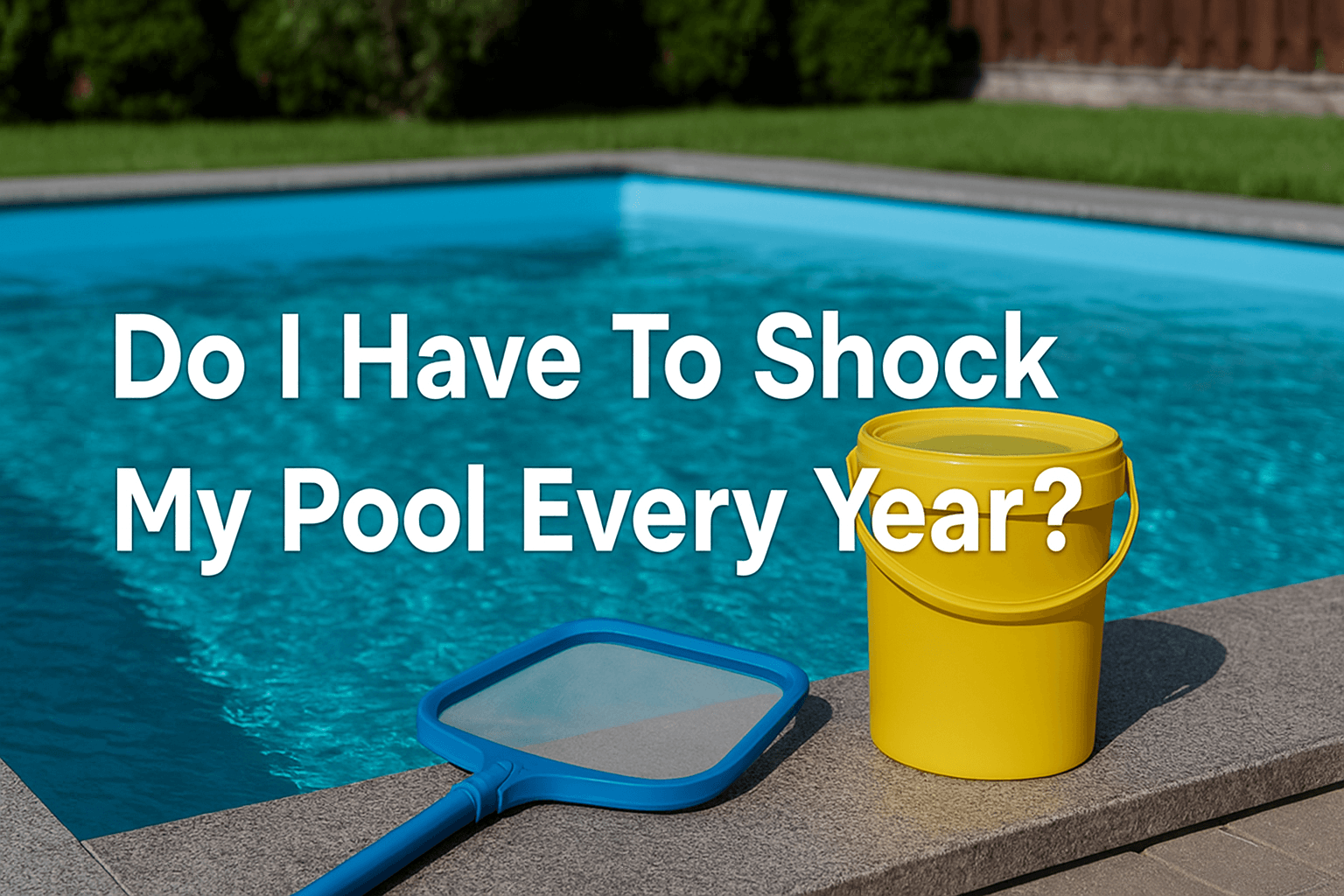
Do I Have To Shock My Pool Every Year?
Do you really need to shock your swimming pool every year—or is that just chlorine paranoia? Short answer: not always! It depends on usage, weather, and water quality. Want to avoid murky surprises, itchy eyes, or wasted chemicals? Stick around—we’ll dive into what your pool actually needs (and when).
We all want our pools to be clean, clear, and safe—especially when the kids are splashing about all summer. Shocking your pool is one of those tasks that sounds intense but can be a total game-changer when done right. That said, the big question remains: is it something you need to do every single year?
Let’s break it down. We’ll cover what shocking actually does, how to spot the signs your pool is crying out for help, and how British weather plays a part.
The Purpose of Pool Shocking
What is Pool Shock? (High Dose of Oxidiser)
Shocking a pool means giving it a hefty dose of oxidiser. This clears out the nasties—sweat, sunscreen, leaves, and everything else that sneaks past your filter.
Think of it like a deep clean for your water. One big sweep to reset everything and keep it fresh.
Breaking Down Chloramines ("Chlorine Smell")
Ever walked past a pool and thought, Wow, that smells like a bleach factory? That strong chlorine smell isn’t actually chlorine—it’s chloramines.
They form when chlorine mixes with contaminants like sweat or urine. Not only do they smell awful, but they also cause red eyes and irritated skin.
A good shock breaks these down and gets rid of the stink.
Killing Algae, Bacteria, and Other Contaminants
Green tinge to your water? Slippery steps? That’s algae making itself at home.
Shocking kills off bacteria and algae that regular chlorine levels can’t handle. It’s like hitting reset when your water starts acting up.
Restoring Water Clarity and Sanitiser Effectiveness
Dull, cloudy water is usually a sign that your sanitiser’s working overtime—or not working at all.
Shocking clears out organic buildup and helps your everyday chlorine do its job properly. The result? Crystal-clear water that actually feels clean.

When and How Often to Shock Your Pool
Not Just Annually: Regular Shocking Throughout the Season
Here’s the truth: you don’t need to shock your pool just because it’s a new year. You need to shock it when it shows signs of stress.
Some pools go all summer without needing it. Others—especially the busy ones—need shocking every week or two.
It’s less about the calendar and more about what’s going on in the water.
Signs Your Pool Needs Shocking (Cloudy Water, Algae, Strong Odour, High Bather Load)
Here’s your checklist:
-
Water looks cloudy or greenish
-
Swimmers complain of itchy eyes or skin
-
You notice a strong chemical smell
-
Loads of people have been in and out recently
If any of these ring a bell, it’s time to reach for the shock treatment.
After Heavy Rain, High Temperatures, or Large Pool Parties
Picture this: you’ve just hosted a birthday party. Twelve kids, two inflatables, and one spilled fruit punch later—your pool’s in chaos.
Big events, heatwaves, or even a good British downpour can throw your pool’s balance out of whack. Shocking helps reset things quickly before issues set in.
As Part of Opening and Closing Procedures
In the UK, your pool isn’t always in use—but seasonal changes still matter. Here’s when to shock:
-
Spring: Clear out winter’s gunk when reopening.
-
Summer: Shock regularly if usage is high.
-
Autumn: Use shock before covering it up for winter.
-
Winter: Occasionally shock if you notice any signs of algae or imbalance during off-season checks.

Types of Pool Shock and Application
Common Types of Pool Shock
Calcium Hypochlorite (Cal Hypo) A classic. It’s strong, fast, and affordable. Great for weekly maintenance—but be sure to pre-dissolve it.
Dichlor This one dissolves quickly and adds stabiliser, which helps outdoor pools hold their chlorine levels.
Non-Chlorine Shock (MPS) No chlorine smell, fast results, and perfect for saltwater pools. Ideal for maintenance without the wait.
Lithium Hypochlorite (Less Common) Harder to find and a bit pricier, but gentle on vinyl liners and dissolves fast.
How to Properly Shock Your Above Ground Pool
Preparing the Pool (Balancing pH, Running Pump) Before you dump anything in, test your water. Make sure your pH is in the sweet spot (7.2–7.6) and run your pump so everything circulates properly.
Safe Application Methods (Dissolving, Evening Application) Always follow the label. Some shocks need pre-dissolving in a bucket. And it’s best to shock in the evening—sunlight breaks chlorine down fast.
Waiting Period Before Swimming Let the shock do its thing. Most times, you’ll need to wait 12–24 hours. Test the water before letting anyone back in—safety first.

Alternatives and Preventing Frequent Shocking
Maintaining Consistent Chlorine Levels
The best way to avoid constant shocking? Keep your chlorine stable.
Use floaters, feeders, or a saltwater generator to maintain steady levels. It’s all about giving your water what it needs before problems start.
Proper Filtration and Circulation
Your filter’s your first line of defence. Run it daily and make sure water’s moving throughout the pool—dead zones are trouble spots.
Regular Brushing and Vacuuming
Don’t just rely on chemicals. Brushing the walls and vacuuming once a week gets rid of algae, dirt, and debris that feed bacteria.
Conclusion
Shocking your pool doesn’t have to be a mystery—or a chore.
The truth is, you don’t need to shock it once a year like clockwork. Instead, shock it when it needs it. Think cloudy water, busy weekends, or after big storms.
With regular maintenance and a little know-how, your swimming pool can stay safe, clean, and ready for cannonballs.
No fuss. No stress. Just clear, sparkling fun.
Have you checked out our other posts?
Do You Put Chlorine In Above Ground Pools?


Leave a comment